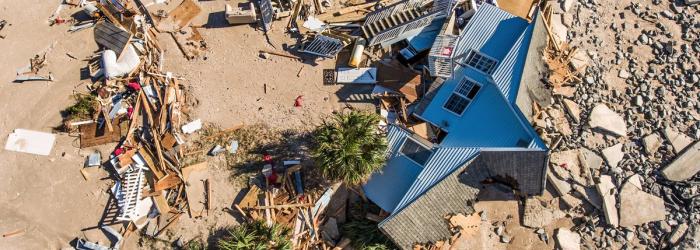Hurricane Matthew – Insurance Help

If your home or business was damaged or destroyed by Hurricane Matthew, you can access guidance and tools through United Policyholders’ Roadmap to Recovery® program for overcoming insurance claim challenges and reaching fair settlements. Scroll down for key tips and a menu of resources.
Focus on completely inventorying and valuing all damage and costs to repair or replace your property, regardless of your insurance situation. If your rental, home or business was insured for flood damage, there are some differences in how a flood versus a home insurance claim gets adjusted and settled, but many similarities. Wind damage will be covered under your homeowner’s policy, while flood damage caused by storm surge may be covered under your flood policy. Check your homeowner’s policy for special deductibles or coverages related to Hurricane damage. You’ll find lots of information in our library, tips, videos and tools. We’re rooting for your recovery and are here to help.
SPECIAL NOTICE: FEMA HAS EXTENDED THE PROOF OF LOSS DEADLINE FOR NFIP FLOOD CLAIMS FROM 60 TO 120 DAYS FOR MATTHEW VICTIMS IN FLORIDA, GEORGIA, SOUTH CAROLINA, NORTH CAROLINA, AND VIRGINIA. *FLORIDA POLICYHOLDERS NOW HAVE 180 DAYS.
This library section will be updated regularly.
Key Insurance Tips
- Take photos of the damage before any clean-up or repairs are done.
- Keep a diary of conversations with insurance, repair, government and other professionals.
- Focus on drying/cleaning out, avoiding further damage, while getting all damage inspected, measured and estimated by qualified, reputable and independent experts.
- Flood insurance policies have different rules than home insurance policies.
- Start working on a detailed and itemized “proof of loss” form but don’t rush and leave things out.
- Give your home and/or flood insurer a chance to do the right thing, but advocate for yourself and be prepared to get help if you’re not being treated fairly. Sources of help include professional claim advocates and attorneys, FEMA, and your state’s Department of Insurance. You may have damage covered by both your homeowners and flood policies. Please visit our State-by-State library for additional resources.
- If a home or flood insurance adjuster says damage isn’t covered, but you feel it should be, get an independent professional opinion before giving up on getting some or all of your claim paid.
Insurance Recovery Information
- After a hurricane – property damage FAQs
- Top ten insurance claim tips
- Hurricane claim guidance library
- Sample Letter Requesting Copy of Policy
- Simplified Guide to Your Declarations Page
- ALE/Loss of Use: What expenses can you claim on your homeowner’s policy?
- Sample Letter Requesting Information About Insurance Benefits for Temporary Living Expenses (“ALE” or “Loss of Use”)
- Flood Recovery & Insurance – Getting Started
- Flood Insurance Claim Tips
- NFIP Proof of Loss, Damage Estimates, and Supplemental Claims
- Flood Insurance Claim Deadlines
- Resolving Flood Insurance Disputes
- The “Dirt” on Insurance Protection for Mud Flow Damage
- Speak UP: How to communicate with your insurance company
- Mold Damage Guide – Information and resources about mold damage
- Sample Claim and Proof of Loss Form
Other News and Resources
- Florida Office of Insurance Regulation
- Georgia Office of Safety Fire Commissioner
- South Carolina Department of Insurance
- North Caroline Department of Insurance
- Virginia Bureau of Insurance
- FEMA: Hurricane safety tips: Learn what to do before, during and after a hurricane
- Ready.gov 6-18 hour pre-hurricane tips
- Hurricane tips from floodsmart.gov
- National Flood Insurance Program
- Watch previous flood workshops United Policyholders hosted in Colorado
- National Disaster Legal Aid
- Disaster Legal Services hotline info
- Insurance Journal: Matthew losses could be as high as $15 billion
- Cancellation/non-renewal protections extended to SC victims
- FEMA: answering your flood insurance questions
Support Resources
Disaster Survivor Support Network: Confidential emotional support, insurance and rebuilding tips from previous catastrophic loss victims/survivors through the United Policyholders Disaster Survivor Support Network (“DSSN”) For a list of and contact info for available DSSN recovery mentors, please email your request to info@uphelp.org and put “DSSN” in the subject line.
Expert Answers to Your Questions: The ”Ask an Expert” tool is an easy and safe way to ask direct questions to attorneys, claims professionals and previous disaster survivors who serve as UP volunteers and get the answers you need. The expert doesn’t see your contact info, but you can contact them if you want to follow up on their answer. To use the forum, please visit the Ask an Expert page here.
Recovery Tools
UP distributes the following tools where funding is available to cover costs. Email your contact information to info@uphelp.org and we will notify you if we secure funding in the Houston area.
- The Disaster Recovery Handbook/Household Inventory Guide: Since 2006 “The Disaster Recovery Handbook and Household Inventory Guide” has been a trusted book that’s led thousands of people through the process of overcoming obstacles to repairing and rebuilding after a major loss. The book is written in plain language by disaster survivors for disaster survivors with tips and expert advice from legal, insurance and personal finance professionals.
- The Roadmap to Recovery Organizer Kit: includes the essential tools for staying organized and recovering financially from serious property damage or loss. Each kit contains a diary/notebook, essential tips and guidance, business card holders, a pouch for receipts and a messenger bag.
- Home Inventory Flashdrives: Most disaster survivors must prepare an itemized and detailed inventory list of every single item they lost in order to recover insurance monies and/or claim tax losses. Creating this inventory is one of the most challenging and time-consuming tasks survivors must complete on the road to recovery. To ease this burden, UP created a home inventory flash drive that’s pre-loaded with helpful content and is easy to use.
